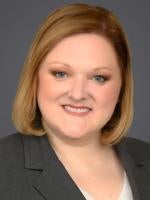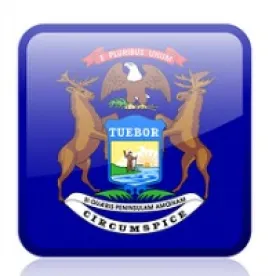The Michigan Occupational Safety and Health Administration (MIOSHA) has issued emergency health and safety rules aimed at controlling, preventing, and mitigating the spread of COVID-19. The emergency rules, which Governor Gretchen Whitmer approved, represent a further effort to fill the void left by a recent Michigan Supreme Court decision invalidating many of the governor’s COVID-19 executive orders.
The MIOSHA emergency rules were issued under Section 48(1) of the Michigan Administrative Procedures Act of 1969 (APA), which allows for the issuance of emergency rules without following the notice and participation requirements of the APA“[i]f an agency finds that preservation of the public health, safety, or welfare requires promulgation of an emergency rule.” The MIOSHA emergency rules took effect on October 14, 2020, and will remain in effect for six months. The emergency rules could be extended for another six months under the APA, with the governor’s certification of need. In the interim, MIOSHA may choose to start permanent rulemaking publication and comment procedures under the APA.
The emergency rules “apply to all employers covered in the Michigan [O]ccupational [S]afety and [H]ealth [A]ct, 1974 PA 154, MCL 408.1001 to 408.1094” and largely mirror many of the COVID-19 related requirements previously imposed by Governor Whitmer’s executive orders (primarily Executive Order (EO) 2020-184). However, as discussed in detail below, some of the requirements are slightly new or different, and several create more questions.
Exposure Determination
The new MIOSHA rules mandate that employers evaluate routine tasks and procedures in the workplace to determine employees’ anticipated risk for exposure to COVID-19. MIOSHA modeled the exposure risk categories after the federal Occupational Safety and Health Administration’s (OSHA) “Guidance on Preparing Workplaces for COVID-19,” issued in March 2020. While EO 2020-184 required all Michigan employers to develop a COVID-19 preparedness and response plan consistent with OSHA’s guidance, the new MIOSHA rules specifically require that employers make an exposure determination for all job categories of employees.
To make an exposure determination, job tasks and procedures must be categorized by degree of risk, ranging from jobs that involve little, if any, exposure to COVID-19 to those that involve a very high potential of risk of exposure to COVID-19. Under the new MIOSHA rules, employers must rate potential exposure using the following categories:
-
Lower exposure risk: Job tasks don’t involve exposure to individuals known or suspected to be infected with COVID-19 or frequent exposure to the public. Workers in this category have little interaction with other workers or the public.
-
Medium exposure risk: Job tasks require employees to have “frequent or close contact … with people who may be infected with [COVID-19], but who are not known or suspected COVID-19 patients.” Workers in this category work “[i]n areas where there is ongoing community transmission” and “may have regular contact with the general public (e.g., schools, high-population-density work environments, [and/or] high-volume retail settings).”
-
High exposure risk: Job tasks involve “high potential for exposure to known or suspected sources of COVID-19.” Workers in this category include medical first responders, law enforcement, licensed health care providers, and more.
-
Very high exposure risk: Job tasks involve “high potential for exposure to known or suspected sources of COVID-19 during specific medical, postmortem, or laboratory procedures.”
COVID-19 Preparedness and Response Plan
As was required under the now invalidated executive orders, employers must create a written “COVID-19 preparedness and response plan” that is consistent with guidance published by OSHA and the U.S. Centers for Disease Control and Prevention (CDC). However, under the new MIOSHA rules, the plan must now specifically include the exposure determinations discussed above and “detail the measures the employer will implement to prevent employee exposure, including any:
-
Engineering controls.
-
Administrative controls.
-
Basic infectious disease prevention measures.
-
Personal protective equipment.
-
Health surveillance.
-
Training”
Consistent with prior executive orders, the plan must be readily available to employees on the business’s website, intranet, or in a hard copy document.
Basic Infectious Disease Prevention Measures
The new MIOSHA rules require employers to “create a policy prohibiting in-person work for employees to the extent that their work activities can feasibly be completed remotely.” This provision resuscitates a controversial provision in the now defunct EO 2020-184 that required all employers to “[p]romote remote work to the fullest extent possible.” However, the inclusion of the remote working “feasibility” standard in MIOSHA’s rules may now serve as a means by which in the context of an employee complaint, MIOSHA may challenge an employer’s efforts to require employees currently working remotely to return to in-person work. Employers that are planning to recall employees who have worked from home since late March 2020 should consider first making thorough feasibility assessments that will support the need for in-person work to resume.
Consistent with prior executive orders, employees who are sick must not be permitted to come to work or must work in isolation. The new MIOSHA rules also require that employers provide hand washing and sanitizing supplies to employees. Employers must “prohibit [employees] from using other workers’ phones, desks, offices, or other work tools and equipment” to the extent possible. Under the new rules, employers must also put in place enhanced cleaning and disinfection measures.
Health Surveillance
The new MIOSHA rules require employers to “conduct a daily entry self-screening protocol for all employees or contractors entering the workplace, including, at a minimum, a questionnaire covering symptoms and suspected or confirmed exposure to people with possible COVID-19, together with if possible a temperature screening.” The rules do not contain guidance on how to determine whether temperature screenings are possible; however, within the industry-specific guidance, temperature screenings are mandated for certain industries (e.g. health care, casinos) consistent with prior executive orders.
Employees must promptly inform their employers if they are experiencing “any signs and symptoms of COVID-19 … before or during the work shift.” The new rules also require that employers isolate employees who are known or are suspected to have COVID-19 from the workforce by preventing them from entering the workplace, sending them home from work, or assigning them to work remotely in isolation as their health allows.
Employers that learn of an employee, customer, or visitor with a known case of COVID-19 must “immediately notify the local public health department” and “[w]ithin 24 hours of learning of the known case, notify any coworkers, contractors, or suppliers who may have come into contact with the person with a known case of COVID-19.”
Employees with a known or suspected case of COVID-19 may be permitted to “return to the workplace only after they are no longer infectious according to the latest guidelines from the CDC and they are released from any quarantine or isolation order by the local public health department.”
Workplace Controls
Under the new MIOSHA rules, employers must designate one or more safety coordinators who will be responsible for implementing, monitoring, and reporting on COVID-19 preparedness and response and, as with the prior executive orders, someone designated to perform this role “must remain on-site at all times when employee are present on site.” Employers must provide face coverings to employees and ensure that social distancing is maintained in the workplace. Employers must require face coverings to be worn where social distancing of six feet cannot be maintained, and face shields are recommended where employees cannot maintain three feet of social distancing. Employees must “wear face coverings in shared spaces, including during in-person meetings and in restrooms and hallways,” regardless of social distancing.
Personal Protective Equipment
The new MIOSHA rules require employers to provide all appropriate personal protective equipment to employees, including respirators where necessary. If respiratory protection is used, medical fit testing is required, as are all other elements of an OSHA-regulated respiratory protection program. Employers that provide medical treatment or housing to individuals with COVID-19 must “ensure that employees in frequent or prolonged close contact with such cases are provided with and wear, at a minimum, an N95 respirator, goggles or face shield, and a gown.”
Industry Specific Requirements
MIOSHA has established additional industry-specific rules applicable in multiple industries and published guidance for each, including:
-
Sports and entertainment facilities
Training Requirements for All Employers
Under the new MIOSHA rules, employers must provide training to employees on COVID-19 infection-control practices, “[t]he proper use of personal protective equipment,” steps to take to alert employers of “any symptoms of COVID-19 or a suspected or confirmed diagnosis of COVID-19,” and “how to report unsafe working conditions.” Training must be provided “in the primary languages [used by] the employee population” and must be updated as needed.
Recordkeeping Requirements for All Employers
The new MIOSHA rules require employers to maintain a record of the following:
-
all COVID-19 employee training;
-
screening information for each employee or visitor entering the workplace; and
-
a record of each notice provided as part of the health surveillance program.
All of these records must be maintained for “[one] year from time of generation.”
Michigan employers may want to become familiar with MIOSHA’s emergency rules and, where necessary, adjust their existing COVID-19 safety measures to ensure compliance. MIOSHA has been aggressive in issuing citations with steep monetary penalties to employers whose COVID-19 response measures have been found to be lacking.




 />i
/>i
